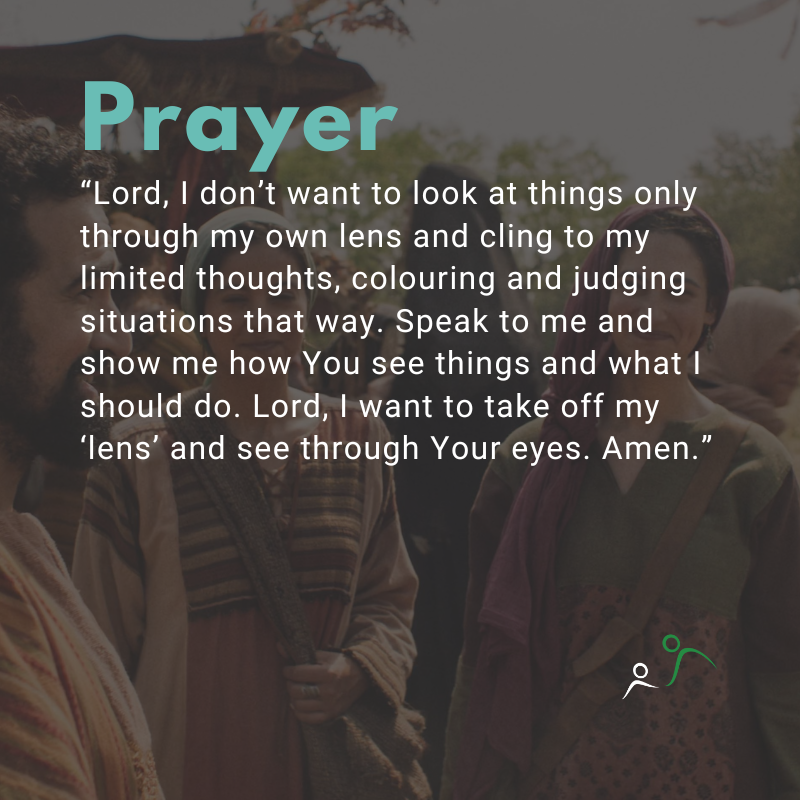Physician, Heal Yourself (S3-E3)Sample

Through which lens are you looking?
Let’s pause for a moment to reflect on the events in the synagogue.
Rabbi Benjamin, as he’s called in The Chosen, prays a beautiful prayer that clearly shows the lens through which he sees the world.
To sum it up briefly, his prayer is essentially:
•Thank you for your provision this year. Please take care of us in the coming year.
•Get rid of the Romans, please.
•We are God’s chosen people—thank you!
•Come, Messiah, come!
At first glance, nothing seems wrong with this prayer. But, as was intended in this video, do you think Rabbi Benjamin realized that the Messiah was standing just a few feet from him? That deliverance was within reach, but in a way they didn’t expect. Yes, Israel was the chosen people, but did that make them perfect, without anything standing between them and God? Did he grasp that? Luke 4 suggests he didn’t.
What you see and believe depends a lot on the lens through which you look. What Rabbi Benjamin said didn’t sound strange to the others in the synagogue. They were familiar with this way of thinking—it fits their worldview. But read Luke 4 carefully; the people in Jesus’ hometown became quite angry at what He said. His words seemed outrageous, even blasphemous.
Were they completely wrong in their perspective? In this case, yes.
This passage holds up a mirror for you and me. What lens are we looking through? What I think or believe should happen—why do I think that, and is it right?
Realize that our thinking is heavily influenced by the time we live in, our culture (our country, hometown, family, church, sports club, etc.), our personality, and our experiences. Our responses to situations and our ideas about who is right or wrong often reveal as much about ourselves as they do about the actual issue. That’s reason enough to be cautious and thoughtful.
In the case of Luke 4, the story ends with Jesus being led to the edge of a cliff. The intent is clear: someone who speaks like this must die, according to the law. Do you realize how strong your opinions can be? And do you realize where they might lead?
I want to learn to be careful with my judgments and the way I think. I want to be aware of my own limited perspective, and my personal biases that I bring into every situation.
How do I practically apply this? I hold my hands out, open before God, and I pray: “Lord, I don’t want to unconsciously hold on to my judgments, to color things in, or to make assumptions. I want to take off my ‘lens’ and see things as You see them. I bring this situation [name it concretely] before You. Speak to me and show me what You see and what I should do.”
Feel free to pray this prayer yourself the next time your thoughts and opinions start to take control…
Take the following questions with you to reflect on:
- Do you recognize that sometimes you view things entirely from your perspective, only to realize how limited that view is?
- What do you do about that?
- What can you learn from Luke 4?

Prayer: “Lord, I don’t want to look at things only through my lens and cling to my limited thoughts, colouring and judging situations that way. Speak to me and show me how You see things and what I should do. Lord, I want to take off my ‘lens’ and see through Your eyes. Amen.”
Scripture
About this Plan

This reading plan explores some of the themes in the "Physician, Heal Yourself" episode of The Chosen TV Series. Reflect, dive into the Bible, and enjoy what Jesus says to you.
More
We would like to thank Alongsiders Europe for providing this plan. For more information, please visit: https://www.alongsiderseurope.org
Related Plans

Noah: A Covenant With Humanity

IHCC Daily Bible Reading Plan - April

Christmas: The Birth of Your Personal Miracle

Learning About Love With St. Valentine

The Wedding at Cana

How God Used Prophets in the Bible

Come Home

The Power of Love: Finding Rest in the Father’s Love

30 Minute Daily Reading Plan
